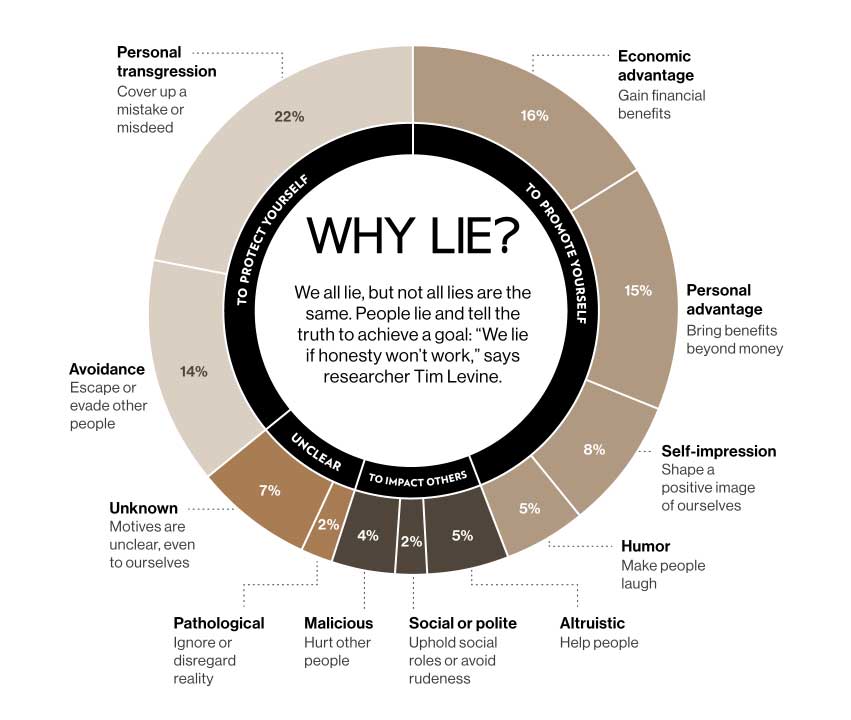Why Honesty and Integrity Are Critical for Prosperity
What if all people were honest?
What if we could all trust that when a person gives his or her word to us, we didn’t have to worry about whether that person truly meant what was said? What if when we hired someone to do a job, when we conducted a transaction, when we loan someone money, or when we enter into could always expect the person we’re interacting with to do what they’ve promised to do? What if we could be always sure that others aren’t misrepresenting themselves or what they’re selling us for their own benefit?
These questions are obviously rhetorical. It’s impossible to imagine a world in which everyone demonstrated utmost integrity and where nobody lies. Humankind has for all of recorded history had a propensity toward dishonesty.
A study summarized in a June 2017 National Geographic article entitled, Why We Lie: The Science Behind Our Deceptive Ways, categorized the reasons people are dishonest. The study grouped the ten reasons people lie into two main categories: to protect oneself and to promote oneself. The top reasons for lying according to the study (originally published by the Journal of Intercultural Communication Research) included covering up mistakes, gaining economic benefits, securing (non-financial) personal advantage, evading people, and to shape a positive image of oneself.
Although the publishers of this study and many others that take on the reasons why people are dishonest note that dishonesty can often be healthy and is at least natural, the cost to society and to any particular individual from intentionally lacking the discipline required to tell the truth is difficult to measure.
Is Your Integrity Not Worth $1,000?
Several years ago I had an experience that became an epiphany for me with regard to my own commitment to being honest, even in a situation where choosing honesty over dishonesty didn’t seem like such a big deal.

I was operating an online store that sold medical equipment that we drop-shipped (meaning we didn’t keep it in stock at our location) from one of our suppliers. One day we received a phone call from someone who placed an order on behalf of her company for a dozen or so of one of the physical therapy evaluation devices we advertised on our website. My wife and I were excited about the order. We calculated our profit on the order: just over $1,000. It made our day!
Shortly after the order was placed, we left the office (which was in our home) to help my sister-in-law with some car problems she was having. While we were unavailable to answer the phone, this customer called back and left a message saying that she needed to cancel the order.
Man, what a bummer! Just as quickly as we’d made the $1,000, it was gone.
My wife (my business partner and one of the best customer service reps we’ve ever had) called back the customer to confirm that she wanted to cancel the order. She told this customer that it’s possible that the order had already been shipped out by our supplier, in which case she would simply need to reject the package once it arrived.
The customer’s response became an unexpected test of my integrity.
She told my wife that if the order had already been shipped, her company would find some purpose to use the products. But if the order had not been shipped, she wanted the order canceled.
When I arrived back in the office, I immediately called our supplier and asked about the order, which we’d placed with them hours before, soon after it had been placed by the customer. The rep I talked to checked with the company’s warehouse crew and called me back nearly 15 minutes later. The order had in fact not been shipped out yet. There was still time to stop it.
Through my mind went these thoughts…
“Well, it would be just as easy to tell the customer that I wasn’t able to stop the order, and it has already been shipped. It’s a big company. They have a budget for this type of thing. What difference would it make if I just call back and tell her we were not able to stop the shipment?”
Then I was received this distinct impression from my conscience (or from what most Christians would call the Holy Spirit, which tends to prick one’s conscience once in awhile): “Is your integrity not worth $1,000?”
The resolution for the situation became clear to me. I felt like my integrity was worth at least $1,000. In fact, I wouldn’t even want to attempt to put a dollar value on what’s it’s worth to me to be honest. I’d like to hope that under any situation like this, no matter what amount of money was at stake, I’d make the same decision.
I asked my supplier to cancel the shipment, then called the customer back to let her know we were able to cancel the order before it was shipped. Although some might argue (and it makes perfect sense taken from a purely secular vantage point) that I lost $1,000 for making that decision, I’d argue that I gained a lot more than that, including a reinforcement that I was
The Law of the Harvest

One of the guiding principles I’ve always try to use in my dealings with people, whether in business or personal matters, is the law of the harvest, a scriptural principle found many times in the Bible, but most commonly referenced from Galations 6:7, which reads: “whatsoever a man soweth, that shall he also reap.“
The law of the harvest is a universally applicable idea that there is always a connection between what a person does, how a person chooses to think and act, and what that person ultimately experiences in terms of blessing or cursing in his life. The law of the harvest doesn’t require earthly policing or monitoring. Understanding and applying the law motivates one to transcend the need for constant external correction and instead rely instead upon an internal conscience to choose to do what’s right, regardless of the short-term consequences. Those who understand and live by the law of the harvest wisely comprehend that ultimately justice and equity will be dealt out fairly to everyone.
In my situation with the customer who I could have easily lied to and told her that the order had already shipped, the law of the harvest says that regardless of whether she knew or cared much about the outcome, the most important aspect of the interaction for me was being honest. The law of the harvest says that any other course of action on my part would have eventually been returned back to me negatively in one way or another.
What’s a Lost and Found?
While I was living in China with my wife early in our marriage, I got a taste of a cultural difference in perspective that has left an impression on me ever since this experience happened.
I was on the corner of a busy street in Shanghai helping my wife hail a taxi when my cell phone fell out of my sweatshirt pocket as I jogged to catch up to an available taxi. I immediately (in about 10-20 steps) recognized that my cell phone had just fallen out of my pocket when I reached inside to make sure it was still secure.
As I retraced my steps, expecting to see my phone lying on the ground, I quickly became disappointed that I couldn’t find it. As I watched the streams of people biking and walking past me, I thought, “Surely one of these people would have seen my phone and noticed that I dropped it.” I half expected that someone was going to walk up to me and hand me the phone I had just dropped.
That never happened. I was blown away.
I quickly asked my wife to call my phone. She did. It didn’t even ring, and it was obvious that whoever picked up the phone turned it off immediately to avoid being confronted or having us track down where it was.
Later that day, as I was talking to my Chinese business partner, I explained to him how disappointing that situation was, and I lamented that someone (not even a professional thief, but a regular commuting worker) would be so dishonest as to see my cell phone fall from my pocket and not return it to me. His response was surprising, “Of course, the person who saw you drop your phone was lucky. He got a free phone.” He then explained that almost anyone who would have seen me lose my phone would have been inclined to keep it, even to hide it from me to avoid being caught.
In all my time growing up in the United States, I had almost never experienced that general mentality. Sure, there are dishonest people who steal things all the time in the US, but by and large people are more likely to return something that they find, especially in situations where the owner can easily be identified, rather than to keep it.
A friend of mine from Mexico recently told me that she was surprised to learn of something called the “lost and found” when she came to the United States. It was shocking to her to learn that when people lose items of value at a rec center and other public places, other people will often turn those things in so that they can be returned to their rightful owners.
Despite the steady decline in honesty among our politicians, business leaders, and the general public, it still feels like the majority of Americans are honest, as evidenced by stories in the news like one that I read recently about two women finding almost $18,000 in cash and making the effort to get it back to the rightful owner.
A Large Credit Risk Industry
Perhaps one of the major indicators of a society hedging against dishonesty is the size of the credit risk industry. Companies like Equifax, Experian, and TransUnion make most of their income helping companies determine how much integrity can be expected of potential borrowers of money and other capital. Equifax has almost $3.5 in annual revenue. Experian takes in almost $5 billion each year. TransUnion’s yearly revenue is about $2 billion. The majority of the income from these companies, which represent the most prominent in the credit risk industry, comes from various products that protect lenders against loaning out money to people who will default or renege on their commitments.
A boost in general commitments to honesty would likely lead to a reduction in the need by banks and other creditors to evaluate to such an extent the risk potential of people who apply for credit.
Economies Are Founded Upon Trust
When I talk to my kids about the implications of dishonesty, I often show them a dollar bill and ask them why it is that stores and others from who something can be purchased are willing to accept a dollar bill and other forms of payment in exchange for something they give of value.
Ultimately it comes down to trust. Our economy, our financial transactions, our ability to buy and sell using any kind of currency is based upon the integrity of those who are associated with the markets that comprise our entire financial and social system.
If our cumulative level of integrity continues to decline as it gradually has since the founding of the United States of America by a group of people who had impeccable integrity, more waste, more fraud, more overhead will continue to be introduced into our system, and it will affect the entire population significantly.
For my part, I will continue to work to be more honest in my dealings, regardless of the financial cost to me personally. And I will teach my children have integrity.
I hope you’ll do the same.







